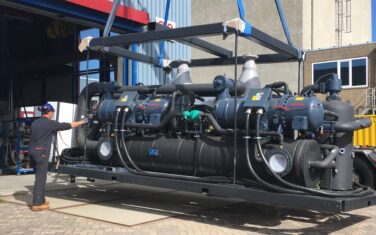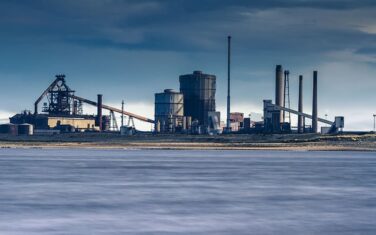We work hard on making the industry more sustainable. And we love to tell stories about it.

The industrial heat pump: analyzing opportunities for the Dutch industry
Het project VERA analyseert de mate waarin de industriële warmtepomp op het moment in Nederland wordt gefaciliteerd.

Fine Biofuels: efficient application for low-value biomass streams
Thewse are the resultas of the Fine Biofuels-project.
A match made in heaven? Workshops series ZERO BRINE matchmaking have started
The ZERO BRINE project is organizing a series of workshops that addresses water re-use and brine stream valorization. The series are aimed at matching brine producers with users of regenerated...
New ecosystem model to implement Industry 4.0 in the chemical industry
In a recent paper, the smart-up ecosystem is introduced as a crucial conceptual model for implementing Industry 4.0. The model offers guidance for small and medium enterprises on how they...

Towards nanofiltration membranes for separation of solvent containing aqueous process streams
New solvent tolerant nanofiltration (STNF) membranes are developed to enable purification of solvent containing industrial aqueous streams.

Making the textile industry future proof
The EColoRO concept includes reclaiming 70% of the wastewater that can be reused in the textile manufacturing process.
Forward Osmosis expected to significantly reduce the use of energy in dewatering processes
On 9 July, at a progress meeting held in Utrecht, the Netherlands, the first pilot-plant tests of innovative forward osmosis membranes to concentrate diverse industrial feed streams were discussed between...
Steel2Chemicals: paving the road for reducing millions of tons of CO2 emission
The steel industry has traditionally been a big contributor to global CO2 emissions, but current developments indicate that this may become a thing of the past. Our new system integration...
HyChain I: exploring the estimated demand in industry
Hydrogen plays a vital role in creating renewable energy systems. To increase the understanding of the role of hydrogen in the industrial energy transition, the Institute for Sustainable Process Technology...
Spray drying droplets for a better quality end product
On July 5th, Eline Both defended her PhD-thesis on spray drying. Scroll down to read more about Eline and her promotion. Spray drying is a widely applied manner of drying...
Strengthening the competitive power with Smart Maintenance Skills Lab
Thanks to a boost of new methods and technologies, Smart Maintenance concepts strengthen the competitive power of companies and have the ability to create new business. To do so, Smart...
How best to treat industrial salt waste streams innovatively and economically
The ORPHEUS project compares membrane distillation and freeze-concentration Currently the process industry generates a significant amount of wastewater. These streams often contain (traces of) organic components in addition to salts....
Monitoring innovation with key performance indicators in quadruple helix collaboration
A thesis on Quadruple Helix (QH) collaborations for the project RiConfigure I am Anne Noordenbos, I study Food Technology at the Wageningen University and Research (WUR). I chose the master...
Serious Games: Developing a standardized evaluation model to test its effectivity
I’m Florine Kroes, master student Food Innovation and Management at Wageningen University (WUR). I came in contact with the Institute for Sustainable Process Technology via the thesis coordinator of the...
Accelerating the implementation of high-temperature heat-pumps in the industry
PINcHED project aims to grab forward momentum and move towards mass implementation Heat-pumps will become an integral part of a society on the road to sustainability. The application of this...

The Dutch climate agreement on industry
The Dutch climate agreement was presented on June 28, 2019. The Netherlands is committed to a pioneering role within the European Union and beyond. We are not going to do...
Moving forward with Membrane Distillation for Industrial purposes
Liquid Gap Membrane Distillation combines leftover heat with box-shaped membranes The development of a new separation technology by means of membranes – membrane distillation – started a few years ago...

Reducing the energy requirements of spray drying
EEMS stands for Energy Efficient Milky Sprays. The project aims to helps spray dry milk products using less energy.
Hydrohub MW Test Centre presented at ECCM
25,7 million goes to 4 initiatives on electrochemistry and sustainable hydrogen Today at the conference on Electrochemical Conversion and Materials (ECCM) David Pappie, director Topsectors and Industry Policy at the...
HyChain 2 model evaluates import costs renewable electricity, hydrogen and hydrogen carriers
Hydrogen could play a vital role in future renewable energy systems. In our HyChain projects, part of our Hydrohub Innovation Program, we look at an optimisation of a future renewable hydrogen...
To lower industrial carbon emissions by means of high temperature heat pumps
The COMTA project proposes the thermo-acoustic heat pump as a solution The industry is a large consumer of energy and about two-thirds of the industry’s energy use is represented by...

Developing fundamental insights into deep eutectic mixtures
Research on deep eutectic mixtures can predict the liquid window of 22 new mixtures, which is essential for new designer solvents.

Understanding and improving separation based on affinity
Recent graduate of the EAMS project, Lisette Sprakel looks back on her experience with the Institute for Sustainable Process Technology during her time as a PhD candidate. My name is...

Nanosheets, a possible game changer in Membrane Technology
An important part of creating a circular economy is the recovery and re-use of valuable components. Industrial waste and discharge streams contain many of these components that, if recovered, can...